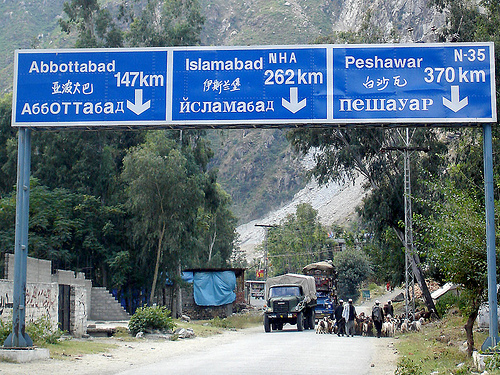
Delhi, India - The elephant in the room of my reporting on security issues within India and Pakistan is the messy, insecure relationship between them. The components of that relationship will be familiar to students of territorial conflict elsewhere: perennial border skirmishes punctuated alternately by all-out war and half-hearted peace talks; sporadic public outbursts calling for deadly final solutions mixed with heart-rending anecdotes about cross-border love. What is unique about this conflict is the schizophrenic way these trends intersect. On any given day, you will hear that India and Pakistan are hurtling toward war and, at the same time, closer than ever to peace.
These days, optimists are focused on a new effort by two leading newspapers—the Times of India and The News in Pakistan—to promote "Aman ki Asha," or "Hope for Peace." In Delhi, the campaign is ubiquitous: billboards, posters, and television advertisements, some featuring major Bollywood lights. But the simple one below, where Pakistanis are trying to request a song on Indian radio, is my favorite.
The goal, says The News, is "mobilising popular pressure for peace on the establishment of both countries." The mechanism, says the Times, is "a series of cross-border cultural interactions, business seminars, music and literary festivals and citizen meets that will give the bonds of humanity a chance to survive outside the battlefield of politics, terrorism and fundamentalism." Looking back on the last year, and speaking to politicians here in Delhi, I am skeptical.
After the 26/11 Mumbai attacks in late 2008, the Indian government took a risky decision not to retaliate militarily against Pakistan. Although many Indians believed New Delhi was being 'soft,' they reelected the Congress Party in May of 2009. At a summit in Sharm-el-Sheikh in July, Prime Minister Manmohan Singh exercised his reelection mandate by announcing new concessions to Pakistan: firstly, he opened the door to discussion of Indian influence in Balochistan (a longtime Pakistani grievance); secondly and more importantly, he agreed to 'delink' the Indo-Pak peace talk - the Composite Dialogue - from progress on counterterrorism, essentially removing a major precondition.
The Sharm-el-Sheikh statement unleashed nationalist furor in India, and created a window for opposition parties to criticize the government. Since I arrived in South Asia in November, the Indian government has been busy with damage control, trying to out-hawk its right wing opposition.
Now, six months since Sharm-el-Sheikh, the Composite Dialogue remains suspended. Though the Indian and Pakistani Foreign Ministries have announced in the last week two potential Indo-Pak meetings in February, India remains resistant to the Composite Dialogue label and the expectation of comprehensive peace that comes with it. Delhi says that Pakistan must do more to combat anti-India groups within its border first. Explains Home Minister Chidambaram, "There are other [Mumbai suspects]. We know their names. We think Pakistan also knows their names. If they do not bring others to trial then I would have to conclude reluctantly and regrettably that they are still dragging their feet."
Foreign Secretary Nirupama Rao has gone further, recently stating that these groups retain active state support, and that the present regime in Islamabad is such a weak negotiating partner that India might welcome, or at least hesitate to condemn, a coup in Pakistan.
Such political gibes are characteristic of the rhetoric with which both India and Pakistan are blaming the other party for the collapse of the peace process. Pakistani Foreign Minister Shah Mehmood Qureshi, for example, recently accused India of political cowardice, double-dealing with Islamabad and taking its foreign policy cues from Washington.
What is important to note is that both states are responding to what they perceive as public opinion. Nadir Hassan at Newsline points out that Pakistani Interior Minister Rehman Malik earned public bona fides for blaming the Indian government for the absence of Pakistani players in India's cricket league, even as his playing the victim card only erodes Indian impressions of Pakistan further. Asked if Pakistan has overreacted, Prime Minister Yusuf Gilani admits, "That's the mood of the public. We've to follow their point of view as well." There is thus ample evidence that India and Pakistan respond to public opinion when it pulls them in a confrontational direction.
But the two governments have often gone furthest towards peace when the political winds were pointed the opposite way. This was the case in 2001, when an otherwise hard-line Indian government and Pakistan's military dictator stood on the verge of a comprehensive treaty. It was equally the case last summer, when two politically vulnerable governments committed to their Composite Dialogue. Moreover, officials from the Chief Minister of (Indian) Kashmir to the 26/11 investigators, believe political dialogue can move public opinion. The nature of the link between public opinion and state policy is one reason to be skeptical about people-to-people diplomacy.
A second reason to be skeptical of Aman ki Asha is the gap in the way Indians and Pakistanis define public diplomacy. Explains Gallup pollster Ijaz Gilani:
When the Indian public thinks of improved relations, it thinks of friendship. When Pakistani public opinion thinks of it, it thinks of cessation of hostilities. Because for Pakistan, 'leave us alone' is the creation of the country. For India, splitting [in 1947] is a sorrowful memory. Pakistan wants the distance to be respected. India wants it to be healed. So when an Indian tries to make friendship and says, 'we are one,' for a Pakistani, that is a very hostile comment.
As Khurram Hussain of Yale University has pointed out, most Pakistanis don't speak of the conflict in terms of '47, but rather in terms of '71, when India aided the independence struggle of then-East Pakistan, now Bangladesh. That is another reason Pakistanis envision peace as respect for differences. When Indians look for differences with Pakistan, what they see are the political battlefields that Aman ki Asha seeks to avoid.
A third reason to be skeptical of Aman ki Asha is the gap between the political development of India and Pakistan. Where public pressure in India has the potential to affect policy, as it did this winter, Pakistan has been a democracy for just a third of its 62-year history, and the leverage of public opinion is weak when stacked against the military. The News in Pakistan has smartly included outreach to military officials in its plans for the peace project, but the emphasis remains on public opinion.
The one force with the political leverage to counterbalance anti-India sentiment in the military is the United States. But the U.S. government, while encouraging peace in general, remains uninterested in forcing either party's hand on specifics. Speaking to the press on a recent visit to Delhi, Defense Secretary Robert Gates reiterated U.S. resolve to stay aloof:
I have been involved with both these countries for a very long time... and I think one thing that has been consistent throughout the past several decades is that both Pakistan and India would prefer to deal with their bilateral problems bilaterally.
That is one reason for Indians and Pakistanis to focus on creating their own, material incentives for peace. Says Pakistani economist Haris Gazdar,
I think India and Pakistan could very quickly have a very strong economic relationship, There's so much complementarity in terms of intra-industry trade and specialization. So factories producing components for Indian factories across the border, that kind of integration. For example in the textile sector, we have certain raw materials and technologies, we can buy machines cheaper from them, artificial fibers from them, they can use more of our cotton. This is the 'problem' with India and Pakistan, because once you say 'let's shake hands,' you can't actually stop before a political embrace. So that's why you see the military establishment pushing them away [economically] because the nature of the embrace can be very profound.
Kashmiri politician Mehbooba Mufti agrees: "The borders should be made irrelevant by encouraging trade."
Moreover, Indian-American Nobel Laureate RK Pachauri points out, without the collaboration of these two large economies, it's hard for smaller neighbors to address challenges like climate change that threaten growth across South Asia. Pradeep Shresthra, Vice-President of Commerce at the South Asian Association for Regional Cooperation, made a similar point when I met with him at the SAARC offices in Kathmandu: "When Pakistan and India won't meet, and with Afghanistan at war, it's very hard for us to do much for the other members."
Shresthra is determined to try. He is working to expand SAARC's program of multiple entry business visas (called SAARC Stickers) to stimulate regional trade. If SAARC can get approval from member nations for the visas (Shresthra wants 500 a month from each country), it will be a rare moment in Indo-Pak history when public opinion and policy are in sync. According to Gallup polls, 80% of Pakistanis and a majority of Indians favor Indo-Pak trade. Now that's "Hope for Peace."




